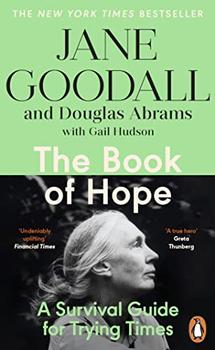Summary | Excerpt | Reviews | Beyond the Book | Readalikes | Genres & Themes | Author Bio

A Survival Guide for Trying Times (Global Icons Series)
by Jane Goodall, Douglas AbramsI
What Is Hope?
Whisky and Swahili Bean Sauce
It was the night before we were to begin our dialogues. I was nervous—because the stakes were high. The world seemed to need hope more than ever, and in the months since reaching out to Jane to ask if she wanted to share her reasons for hope in a new book, the subject of hope had been uppermost in my thoughts. What is it? Why do we have it? Is hope real? Can hope be cultivated? Is there really hope for our species? I knew my role was to ask the questions we all wrestle with as we experience adversity and even, at times, despair.
Jane is a global hero who has traveled the world for decades as a messenger of hope, and I was eager to understand her confidence in the future. Equally, I wanted to know how she had sustained hope during her own challenging and pioneering life.
As I was eagerly and anxiously preparing my questions, the phone rang.
"Would you like to come around for dinner with the family?" Jane asked. I had just landed in Dar es Salaam, and I told her I would be delighted to join her and meet her family. It would be a chance not just to meet the icon but to see her as mother and grandmother; to break bread; and, as I suspected, to sip whisky.
Finding Jane's house is not easy, as there is no real street address. It is down a number of dirt roads and next to the large compound of Julius Nyerere, the first president of Tanzania. I was afraid I might be late as the taxi tried unsuccessfully to find the right entrance in the tree-covered neighborhood. The red sun was descending quickly and there were no streetlights to guide us.
When we finally found the house, Jane greeted me at the door with a warm smile and wide, penetrating eyes. Her gray hair was pulled back in a ponytail, and she wore a green button-down shirt and khaki pants, which looked a little like the uniform of a park ranger. On her shirt was a logo for the Jane Goodall Institute (JGI) with the symbols of the organization: a profile of Jane, a chimpanzee knuckling on all fours, a leaf for the environment, and a hand for the humans that she has come to realize need protection along with the chimps.
Jane is eighty-six, but inexplicably she doesn't seem to have aged very much since she first went to Gombe and graced the cover of National Geographic. I wondered if there is something about hope and purpose that keeps one endlessly young.
But what stands out most is Jane's will. It shines from her hazel eyes like a force of nature. It is the same will that first moved her halfway around the globe to study animals in Africa and has kept her traveling for the last thirty years. Before the pandemic, she was spending more than three hundred days a year lecturing about the risks of environmental destruction and habitat loss. Finally, the world is starting to listen.
I knew that Jane liked her evening whisky and had brought her a bottle of her favorite, Green Label Johnnie Walker. She graciously accepted it—but later she told me I should have bought the cheaper one, Red Label, and donated the extra money to her environmental organization, the Jane Goodall Institute.
In the kitchen, Maria, her daughter-in-law, had prepared a Tanzanian vegetarian meal. There was coconut rice served with a creamy Swahili bean sauce; lentils and peas with a hint of ground peanuts, curry, and coriander; and sautéed spinach. Jane says she cares nothing about food, but I can't say the same and my mouth was already beginning to water.
She placed my little gift on the counter next to a giant, four-and-a-half-liter bottle of Famous Grouse whisky. Jane's adult grandchildren had gotten it for her as a surprise, and they explained that it was so much cheaper to buy in bulk and would surely last for the time she would be with them. Her grandchildren live in the house in Dar es Salaam where Jane moved when she married her second husband, though in those days most of her time was still spent in Gombe. Now Jane spends time in the house only during her short twice-a-year visits to Tanzania and only for a few days at a time, as she also goes back to Gombe and other towns in Tanzania.
Excerpted from The Book of Hope by Jane Goodall and Douglas Abrams. Copyright © 2021 by Jane Goodall and Douglas Abrams. Excerpted by permission of Celadon. All rights reserved. No part of this excerpt may be reproduced or reprinted without permission in writing from the publisher.
Analyzing humor is like dissecting a frog. Few people are interested and the frog dies of it.
Click Here to find out who said this, as well as discovering other famous literary quotes!
Your guide toexceptional books
BookBrowse seeks out and recommends the best in contemporary fiction and nonfiction—books that not only engage and entertain but also deepen our understanding of ourselves and the world around us.